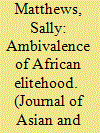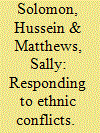| Srl | Item |
| 1 |
ID:
096042


|
|
|
|
|
| Publication |
2010.
|
| Summary/Abstract |
Recent discussions in South Africa about the role of the so-called patriotic bourgeoisie highlight the much debated question of what role elite Africans can and ought to play in the upliftment of the poor. Those supporting the notion of a patriotic bourgeoisie believe that national or racial solidarity is sufficient to allow privileged Africans to act in the interests of their poorer fellow citizens. However, a reconsideration of an older discussion of African elitehood, that of Amilcar Cabral, suggests that something more may be needed before elites can act in the interests of the poor. Cabral argues that elites need to renounce their privilege and to live and struggle alongside the poor if pro-poor societal transformation is to be achieved. While Cabral may be right that shared racial or national identity is insufficient for elite solidarity with the poor, he does not consider all the complexities that arise when elites actually try to work with and for the poor. A consideration of the experiences of a long-standing Senegalese NGO reveal some of these complexities and suggest that any attempt by African elites to engage meaningfully in the upliftment of the poor, will inevitably involve continuous and difficult negotiation between paternalism and naïve egalitarianism.
|
|
|
|
|
|
|
|
|
|
|
|
|
|
|
|
| 2 |
ID:
156650


|
|
|
|
|
| Summary/Abstract |
While post-development theory is very concerned with the ways in which development has impacted upon the countries of the Global South, there has been relatively little written on post-development theory from an African perspective. This paper identifies some of the ways in which post-development theory fails to adequately understand the African experience of development. In particular, I explore the difficulty that post-development theory confronts when faced with the continued desire on the part of many people in Africa for development. In his introduction to the new edition of The Development Dictionary, Wolfgang Sachs discusses this desire, noting that despite development’s many failures, many still associate the concept with self-affirmation and redress. He explains this continued desire for development as being indicative of the need for the decolonisation of the imagination. In this paper, I show some of the problems with this explanation and present alternative ways of understanding the persistence of the desire for development in Africa.
|
|
|
|
|
|
|
|
|
|
|
|
|
|
|
|
| 3 |
ID:
086214


|
|
|
|
|
| Publication |
2009.
|
| Summary/Abstract |
From Chiapas in Mexico to Chechnya in the Russian federatio, from India to Indonesia and from Algeria and Angola to Afghanistan, the world is witnessing a return to the "cult of origin" where difference often means destruction, destitution, despair and death.
|
|
|
|
|
|
|
|
|
|
|
|
|
|
|
|
| 4 |
ID:
085172


|
|
|
|
|
| Publication |
2008.
|
| Summary/Abstract |
The debate between post-development theorists and their critics has raised several important questions, one of them being the question of how relatively privileged people may respond meaningfully to poverty while not perpetuating the flaws of past development practice. In this article I build upon the ideas of several contributors to the post-development debate in order to suggest three ways in which we who are relatively privileged may play a role in struggles against poverty. I argue that we can work to rethink the concepts informing development practice; that we may find ways to give our support to popular initiatives, and that there are aspects of our own societies which we may change in solidarity with the struggles of distant others.
|
|
|
|
|
|
|
|
|
|
|
|
|
|
|
|